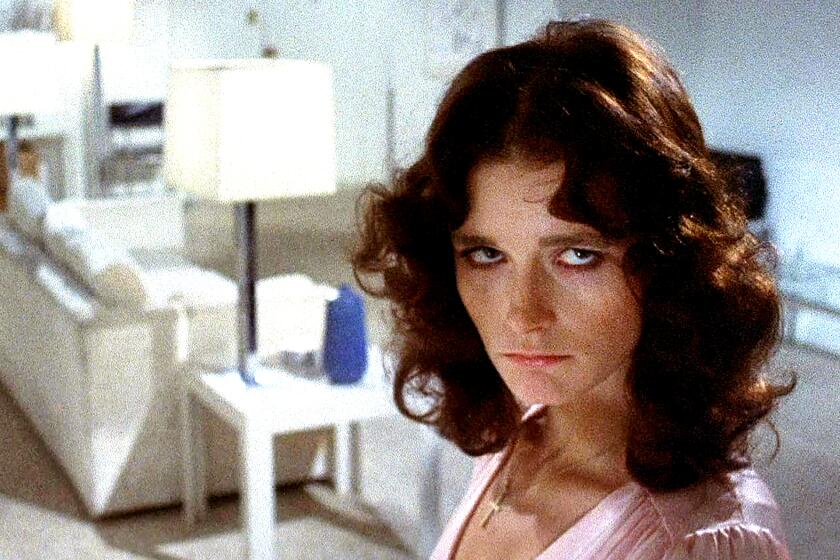In a Public Housing Project, Death Stalks the Children
CHICAGO — From his second-floor apartment on the city’s north side, Alex Kotlowitz can look out on a small park created by some of his neighbors. A garden there is tended each summer by neighborhood children.
But Kotlowitz’s gaze has not been on the park across the street or the children working in its garden. For the last four years, the author of “There Are No Children Here: The Story of Two Boys Growing Up in the Other America,” published in March by Doubleday, has focused on the children of Henry Horner Homes, a different Chicago neighborhood five miles away.
The sense of community characterized by the little park in Kotlowitz’s middle-class neighborhood is absent at Henry Horner. There are no gardens at the grimy, neglected public-housing project, home of Lafeyette Rivers and Pharoah Rivers, the young brothers who are the protagonists of Kotlowitz’s book.
At Henry Horner, drugs, gangs and shootings are a daily fact of life.
“Nobody trusts nobody. There’s a feeling around here that trusting someone can mean losing your life,” says LaJoe Rivers, the boys’ mother. “There’s no kids’ activities, no stores. The children around here are not being led into the future but into violence and death.
“I’m blessed,” says LaJoe Rivers. “I still have my kids. With gangs and drugs and kids caught in cross fire, many here don’t.”
LaJoe Rivers was 4 when her family moved to the then-new project 35 years ago. “We had flowers. It was clean. There wasn’t all this cement,” she recalls. “But the flowers died years ago along with the neighborhood.”
Kotlowitz met Lafeyette, then 10, and his brother Pharoah, 7, in 1985. A free-lance writer, Kotlowitz had been asked to write the text for a photo essay on children of poverty. Though his contact with the brothers was brief, he was struck by the relentless violence they described.
Two years later, having become a Wall Street Journal reporter, Kotlowitz met Lafeyette again and wrote an article about the emotional toll the day-to-day violence took on the young boy. In diary form, Kotlowitz reported the brutality Lafeyette witnessed that summer.
The article began with an account of June 13, 1987, Lafeyette’s 12th birthday. Gunfire erupted on the lawn of the project. The boy ordered his 9-year-old cousin to hold her head down. He covered her with a flimsy pink jacket in an effort to protect her.
It ended with the events of Aug. 28, the day Lafeyette and Pharoah attended the funeral of a Henry Horner boy who had begun working for a local gang. The 15-year-old was shot in the chest at point-blank range by a gang member.
Between the June and August entries, Kotlowitz reported additional gunfire, beatings, rape, killing and gang violence. LaJoe Rivers took out burial insurance for Lafeyette, Pharoah and her 4-year-old triplets.
The article planted the seed that led to the book. Kotlowitz took a two-year unpaid leave from the Wall Street Journal and spent the better part of that time at Henry Horner. “I remember Lafeyette telling me that he saw a boy shot on his stairwell and a girl shot in the leg while jumping rope outside his apartment window,” Kotlowitz says of his first brief meeting with Lafeyette six years ago.
Nevertheless, “There Are No Children Here” is not only a chronicle of seemingly endless violence. It also is a portrait of children who--despite the ugliness in their lives--resist the lure of gangs, win spelling bees, shoot marbles, chase rainbows and display fierce love of family and great generosity.
Although the Rivers boys’ older sister uses drugs and often leaves her three children in their already overburdened mother’s care, “Lafeyette and Pharoah would defend their sister to their dying days,” says Kotlowitz.
When Kotlowitz turned 35 last year and was struggling to finish his book, the boys and their mother threw him a surprise party. As the writer was leaving, a raggedly dressed 10-year-old boy walked up to the writer, pushed a crumpled dollar bill into his hand and wished him a happy birthday.
“There is this huge wall of silence around these neighborhoods,” Kotlowitz says, and a sense that no one outside the projects will ever believe what goes on inside them. In the course of writing his book, Kotlowitz found he was distancing himself from his friends and colleagues. “I just couldn’t imagine they would believe or understand what all was going on there,” he says.
“One of the myths I suspected going in was that somehow you could learn to live with all this disappointment and loss of life.
“You don’t,” he says. “(The kids) adjust their lives and compensate for it in different ways, but it’s something they never, ever get used to.”
Kotlowitz and his book subjects have become extremely close. “They’ve lent a certain spirit to my life,” Kotlowitz says. “Watching the two of them put up with all they have and retain a sense of who they are and some sense of spirit has been an inspiration for me. I just like hanging out with them.”
“Alex is our best friend,” says Lafeyette, 15.
“He takes us places,” says Pharoah, 12.
For three years, the three have spent almost every Saturday together playing basketball, taking walks, visiting museums. For each of the last two summers, they have spent a week fishing together in Michigan. They will go again this year.
The Michigan vacations are a magical time for the two boys, who experience a peace and quiet in the country that they cannot find at home. Typically, Pharoah, who has a stutter precipitated by tension, will begin to stammer as Kotlowitz’s car approaches Chicago on the way back from Michigan. Lafeyette, too, becomes visibly depressed as his vacation comes to an end.
Kotlowitz chose Lafeyette and Pharoah because he felt that together they offered a contrast in how some kids deal with the terror that is part of daily life at Henry Horner Homes.
Lafayette, a quiet boy who cares deeply about others, never cries and keeps his emotions well concealed. Even before reaching adolescence, he served as a confidant for his mother. “Lafie and me share things as two adults that Pharoah doesn’t know,” she says. “We try to make Pharoah have his childhood.” But her relationship with Lafeyette adds to the older boy’s troubles, she admits.
When the family’s public assistance was cut because officials discovered (by reading Kotlowitz’s article in the Wall Street Journal) that the boys’ father lived with them, Rivers turned to Lafeyette for comfort. The older boy scolds his younger siblings for “hanging out with the wrong people,” or for straying out of his sight. He often irons the triplets’ clothing and prepares their breakfasts before walking them to their elementary school to ensure they reach it without incident.
Protected by his mother and older brother, Pharoah is a spirited child who loves school and attempts to create his own world amid the dirt and grime of Henry Horner. At age 4, he told his mother he wanted to live on a lake so he could feel the wind on his back. At 8, he began listening to classical music on the radio because it “relaxed” him. One summer he sat on the well-manicured lawn of a condominium complex three blocks away from Henry Horner to daydream and find peace.
A small baby-faced boy, Pharoah desperately clings to his childhood. “I’m too young to understand,” he often tells his mother when confronted with bad news or violence. In a letter to his second oldest brother who is serving an eight-year jail term he wrote: “I’m to (sic) little to understand what is happing (sic). But I want to tell you I miss and love you.”
The family received no financial renumeration for their cooperation in the book’s making. However, with the book now in its fourth printing and with paperback rights sold to Doubleday, nearly half the anticipated royalties will go into trust funds Kotlowitz has set up for the boys. He has also started trust funds for two other boys from the neighborhood. “You sort of want to embrace everyone,” he says.
Oprah Winfrey has bought the rights to the book for a made-for-television film. The advance money from the deal will be used to help the Rivers family move out of the project by summer.
“I started off as a journalist and became in the process a very good friend with the kids and their family,” Kotlowitz says.
However, he does not chronicle his presence in the boys’ lives or his relationship with them in the book. The writer refuses to pose with the boys for photographs promoting the book for fear of exploiting their friendship. He worries that celebrity could in some way hurt them in the future. He asks that publicity about the book refer to the family as “Rivers,” the invented surname he uses in the book to protect the family’s privacy. “It’s one thing to star as the subject of a book and another to be famous because you’re poor and black,” he says.
The writer worries, too, that publicity about the book will focus more on his relationship with the boys than on the abject social and economic conditions that shape their lives and the often inspirational resilience they display in the face of those conditions. For all his fondness for Lafeyette and Pharoah, he is well aware that they are but two of millions of children growing up in similar conditions.
Kotlowitz hopes his book will have the same effect on readers that spending time at Henry Horner Homes had on him.
“At first, I was absolutely horrified and saddened. I had my days when I cried after talking to the kids.” But ultimately, he says, he experienced an “indignant fury” that a civilized nation can let these conditions go on.
“I want the book to sound a wake-up call for us as a nation. Morally we have a responsibility to figure out ways to repair these neighborhoods and help return them to some dignity for the people living there,” Kotlowitz says.
“I want this book to go to Washington and for the politicians to come here,” says LaJoe Rivers.
She proudly displays a copy of the book atop a glass cake plate in a china cabinet in the family’s apartment.
“Before Alex wrote the book, (Lafeyette) would say, ‘Mama, nobody cares; we’re going to live this way until we die.’ When I showed him (a newspaper story about the book) he told me, ‘Mama, somebody’s listening.’ And he was really smiling.” Her son seldom really smiles, she says.
More to Read
Sign up for our Book Club newsletter
Get the latest news, events and more from the Los Angeles Times Book Club, and help us get L.A. reading and talking.
You may occasionally receive promotional content from the Los Angeles Times.







